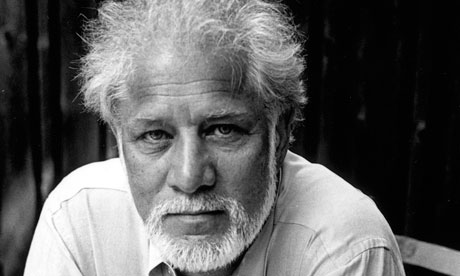Novelist and poet Michael Ondaatje, who won the Booker prize for The English Patient, draws on his own extraordinary life to conjure up evocative tales of duality and displacement. Robert McCrum asks how much reality there is in his fiction…

Double vision: a Canadian citizen, Michael Ondaatje is still “profoundly Sri Lankan”. Photograph: Jeff Nolte
The eyes of Michael Ondaatje, prize-winning author of The English Patient, are a baffling window on the inner man: the brilliant, pale sapphires of a witty Dutch burgher set in a 68-year-old Tamil frame. As he says of himself and his work, "I am a mongrel of place. Of race. Of cultures. Of many genres." An interview with Ondaatje is a playful compendium of anecdote, on-the-hoof cultural criticism and crafty conversational shape-shifting. "Charm" is a dangerous word, but an hour or two with Michael Ondaatje is a beguiling experience.
The more you look, the more dizzyingly kaleidoscopic he seems to become: a Canadian citizen who remains profoundly Sri Lankan. A winner of the Booker prize who first made his name as a poet. An admirer of Robert Browning and Thomas Wyatt who finds his deepest inspiration in the aesthetic traditions of the East. A writer whose 2007 title, Divisadero, encrypts a double meaning, derived from the Spanish word for "division", or from divisar, meaning "to gaze at something from a distance".
If Ondaatje, the man, is divided and detached, then Ondaatje, the writer, is militantly opposed to western habits of narrative. This is partly because he was raised in Ceylon's oral tradition: "tall stories, gossip, arguments and lies at dinner". He quotes the critic John Berger with approval: "Never again will a single story be told as though it were the only one." This, he adds, "is the possibility of our age. A person grows up in Colombo or Wichita and their true mentor or touchstone could be Calvino or Miles Davis, or it could be a political gesture or act in a far away place."
Those words could almost be the epigraph to his new novel, The Cat's Table – an end-of-empire adventure story about a boy's life-changing journey from Ceylon (as it was) to England in the early 50s. This rite of passage was experienced by the 11-year-old Ondaatje but – more duality – he insists that The Cat's Table (named after the lowest station in the ship's dining-room) is a work of fiction. "Although the novel sometimes uses the colouring and locations of memoir and autobiography," he says, "it is fictional."
McCrum's full piece here.
The more you look, the more dizzyingly kaleidoscopic he seems to become: a Canadian citizen who remains profoundly Sri Lankan. A winner of the Booker prize who first made his name as a poet. An admirer of Robert Browning and Thomas Wyatt who finds his deepest inspiration in the aesthetic traditions of the East. A writer whose 2007 title, Divisadero, encrypts a double meaning, derived from the Spanish word for "division", or from divisar, meaning "to gaze at something from a distance".
If Ondaatje, the man, is divided and detached, then Ondaatje, the writer, is militantly opposed to western habits of narrative. This is partly because he was raised in Ceylon's oral tradition: "tall stories, gossip, arguments and lies at dinner". He quotes the critic John Berger with approval: "Never again will a single story be told as though it were the only one." This, he adds, "is the possibility of our age. A person grows up in Colombo or Wichita and their true mentor or touchstone could be Calvino or Miles Davis, or it could be a political gesture or act in a far away place."
Those words could almost be the epigraph to his new novel, The Cat's Table – an end-of-empire adventure story about a boy's life-changing journey from Ceylon (as it was) to England in the early 50s. This rite of passage was experienced by the 11-year-old Ondaatje but – more duality – he insists that The Cat's Table (named after the lowest station in the ship's dining-room) is a work of fiction. "Although the novel sometimes uses the colouring and locations of memoir and autobiography," he says, "it is fictional."
McCrum's full piece here.

No comments:
Post a Comment